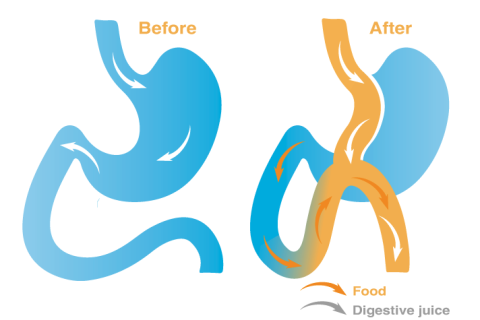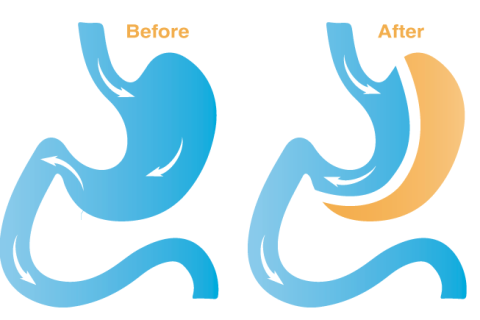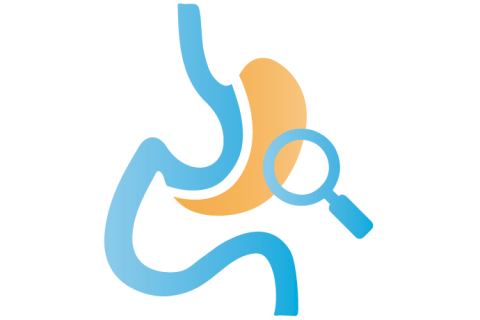Mini Gastric Bypass (MGB) is a minimally invasive weight loss surgery that combines stomach restriction and intestinal bypass in a simpler, shorter procedure compared to the traditional bypass. A small stomach pouch is created and connected to the small intestine, reducing food intake and absorption. MGB helps patients lose significant weight, improves or resolves conditions like type 2 diabetes and hypertension, and offers faster recovery. It is effective, reversible, and with fewer complications, making it a strong option for patients needing metabolic and bariatric solutions.
MINI GASTRIC BYPASS

MINI GASTRIC BYPASS
The mini gastric bypass is a simplified version of the traditional bypass. It creates a small stomach pouch and connects it to a lower section of the small intestine with a single anastomosis. This limits food intake and reduces calorie absorption, leading to effective weight loss. It’s less invasive, with a shorter surgery time and similar long-term results to the standard bypass.
Approval within 24hrs
Mini Gastric Bypass Surgery in Tijuana Mexico
- Simpler Procedure – Shorter and less complex than the traditional gastric bypass.
- Stomach Pouch – A small pouch limits food intake, helping patients feel full faster.
- Intestinal Bypass – Reduces calorie absorption, enhancing weight loss.
- Health Benefits – Can improve or resolve diabetes, hypertension.
Mini Gastric Bypass Surgery in Tijuana Mexico With Dr. Arturo Figueroa
Candidacy and Application
Patients must first be evaluated to ensure they are good candidates for mini gastric bypass surgery. Please complete our Surgery Approval Form. This allows our medical team to review your health history and determine if you are medically cleared for surgery.
Reservation and Deposit
Once approved, the next step is to reserve your surgery date. A deposit of $460 USD is required to secure your spot, which is fully applied toward your surgery balance.
Travel and Final Payment
Patients email flight details so our team can arrange airport pickup and local transportation. The remaining balance is paid in cash at the hospital upon arrival. You will receive complete instructions and preparation details by email well before your procedure.
Who is a Good Candidate for Mini Gastric Bypass Surgery
Mini gastric bypass is recommended for individuals with severe obesity who have not achieved lasting results through diet, exercise, or medical treatments. Candidates often have a BMI of 40 or higher, or a BMI of 35 or higher with obesity-related conditions such as type 2 diabetes, high blood pressure, sleep apnea, or heart disease.
Because this procedure can increase the risk of bile reflux, it is not recommended for patients with severe gastroesophageal reflux disease (GERD). Beyond medical criteria, candidates must be committed to long-term lifestyle changes, including healthy eating, regular activity, and consistent medical follow-up.
How the Procedure is Performed
The mini gastric bypass is performed laparoscopically through small incisions. Dr. Figueroa creates a long, narrow stomach pouch that limits food intake. Instead of dividing the intestine in two places as in the traditional bypass, the pouch is connected directly to a lower section of the small intestine, creating a single connection.
This simplifies the operation, reduces surgical time, and still restricts food intake and absorption. Patients feel full sooner, eat less, and absorb fewer calories. Over time, this leads to substantial weight loss and improvement in obesity-related conditions.
Mini Gastric Bypass Process at the Hospital
Arrival – One Day Before Surgery: Upon arrival at San Diego International Airport, our driver will pick you up and bring you to the hospital facilities. You and your companion (if applicable) will check into a comfortable private room with Wi-Fi, climate control, and all amenities for your overnight stay.
Surgery Day: At 7:00 am, pre-operative testing begins with EKG and lab work. Once cleared, you will meet Dr. Figueroa and his surgical team for final questions and review.
During Mini Gastric Bypass Surgery: Using laparoscopic techniques, a small pouch is created and joined to a loop of the small intestine. This reduces stomach size and shortens the digestive path. The procedure usually takes 60–90 minutes. You will then recover under close medical supervision.
.
Preparing for Mini Gastric Bypass Surgery
Medical Evaluation – Includes lab tests, imaging, EKG, and sometimes endoscopy to ensure safe surgery.
Nutritional Counseling – A dietitian prepares you for new eating habits: portion control, balanced meals, and avoiding high-sugar or high-fat foods.
Pre-Operative Diet – For 1–2 weeks before surgery, patients follow a special diet to shrink the liver, including protein shakes, lean proteins, vegetables, clear fluids, and eliminating sugar, alcohol, fried foods, and excess carbs.
Supplements – Because absorption is reduced after surgery, patients begin supplements such as:
- Multivitamin with iron
- Calcium citrate with vitamin D
- Vitamin B12
- Sometimes folic acid or extra iron
Lifestyle Adjustments – Stop smoking at least 4–6 weeks before surgery, avoid alcohol, practice mindful eating, and start light exercise if approved by your doctor.
Medication Management – Certain medications (blood thinners, NSAIDs, some diabetes drugs) may need adjustment. Always follow the medical team’s guidance.
Day Before Surgery – Most patients are asked to switch to clear liquids, then fast after midnight. Detailed instructions are provided to ensure a safe procedure.
The Mini Gastric Bypass (MGB) has become one of the most trusted and versatile weight loss surgeries available today. It offers a balance of effectiveness, safety, and flexibility, making it an excellent choice for individuals seeking their first bariatric procedure as well as for those in need of a revision after previous surgery such as gastric sleeve or gastric band.
Unlike more complex procedures, the mini bypass combines a streamlined surgical technique with powerful results in weight loss and improvement of health conditions. Patients benefit from its shorter operative time, reduced risks, and long-term effectiveness. For those who have experienced complications or limited success with other bariatric surgeries, the mini bypass provides a reliable path to renewed progress.
Below are ten of the key advantages that make the Mini Gastric Bypass a preferred solution for many patients.
- MGB provides substantial and sustained weight loss by combining restriction (smaller stomach pouch) with mild malabsorption.
- Patients often lose 70–80% of their excess weight in the first 18–24 months.
- Compared to a traditional Roux-en-Y gastric bypass, the MGB involves fewer anastomoses (connections), making the surgery shorter and technically simpler.
- This can reduce operative risks and recovery time.
- With only one intestinal connection, there is less chance of complications such as leaks or strictures compared to the full bypass.
- This is especially important for patients seeking revision surgery, where risks are naturally higher.
- MGB is considered easier to revise or reverse than a Roux-en-Y bypass if needed.
- This makes it a safer option for patients uncertain about permanent anatomical changes.
- For patients who have regained weight or experienced complications after sleeve or band surgery, MGB is highly effective at restoring weight loss results.
- It also addresses persistent reflux issues that can develop after a sleeve gastrectomy.
- MGB is proven to significantly improve or resolve conditions like type 2 diabetes, high blood pressure, sleep apnea, and acid reflux.
- Some patients experience diabetes remission within days of surgery, before major weight loss occurs.
- Because the bypassed portion of intestine is shorter than in a Roux-en-Y, there is less malabsorption.
- Patients still need supplements, but the risk of severe long-term deficiencies is lower.
- Many patients go home within 2–3 days, and return to daily activities faster compared to more complex procedures.
-
The simplified surgical design leads to fewer internal hernias and obstructions compared to traditional gastric bypass.
-
The lower surgical complexity makes it attractive for both surgeons and patients.
-
Because of shorter operative time and fewer complications, MGB is often more affordable than other complex bariatric procedures.
-
It is widely available as both a primary and revision option, making it accessible to patients with different needs.
1. Effective Weight Loss
2. Simpler Surgical Technique
3. Lower Risk Profile
4. Reversibility and Flexibility
5. High Success as a Revision Surgery
6. Resolution of Comorbidities
7. Reduced Risk of Nutritional Deficiencies vs. Full Bypass
8. Shorter Recovery and Hospital Stay
9. Lower Long-Term Complication Rates
10. Cost-Effective and Accessible
Please call (888) 349-4769
Or contact us via email form below
Other Services
Since its founding Medicenter has been providing its patients with full medical care, encompassing
outpatients services, laboratory and imaging diagnostics, dentistry, dentistry and immediate care.

GASTRIC SLEEVE
The gastric sleeve, or sleeve gastrectomy, involves removing about 70-80% of the stomach, leaving a small, sleeve-shaped pouch. This restricts food intake and reduces hunger by lowering ghrelin hormone levels. It’s a popular option for significant weight loss and can improve or resolve obesity related health conditions like diabetes and high blood pressure.

REVISION SURGERY
Revision surgery is performed to address complications, improve results, or adjust previous weight loss surgeries. It can include resizing a gastric pouch, converting a sleeve to a bypass, or addressing issues like insufficient weight loss or reflux. Each procedure is tailored to the patient’s needs, offering renewed success and relief from surgical challenges.

MINI GASTRIC BYPASS
The mini gastric bypass is a simplified version of the traditional bypass. It creates a small stomach pouch and connects it to a lower section of the small intestine with a single anastomosis. This limits food intake and reduces calorie absorption, leading to effective weight loss. It’s less invasive, with a shorter surgery time and similar long-term results to the standard bypass.
